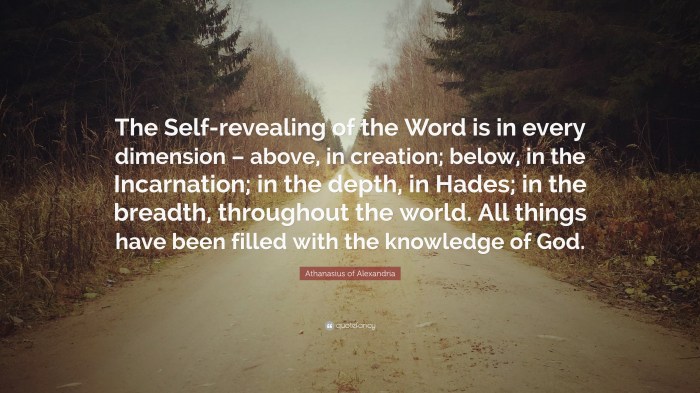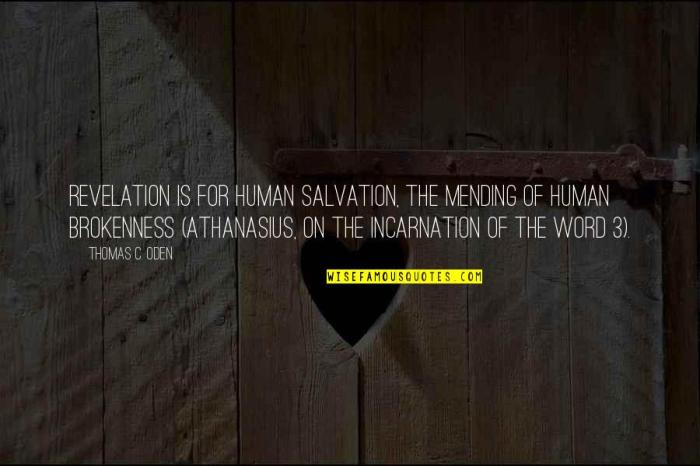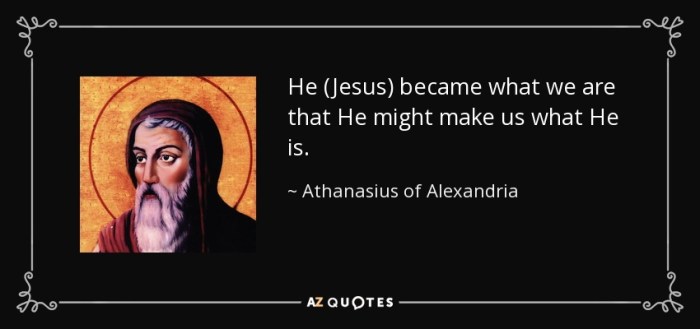Athanasius on the incarnation quotes – Athanasius on the Incarnation: Quotes and Insights provides a comprehensive overview of Athanasius’s influential views on the nature of Christ, the incarnation, and the Trinity. His writings played a pivotal role in shaping Christian doctrine and continue to be studied and debated today.
Athanasius, a fourth-century bishop of Alexandria, was a staunch defender of orthodox Christianity against the Arian heresy. He argued that Christ was fully divine and fully human, and that the Trinity was a unity of three distinct persons.
Athanasius on the Nature of Christ
Athanasius, Bishop of Alexandria, was a prominent theologian in the early church. He is best known for his defense of the doctrine of the Trinity and his opposition to Arianism.
Athanasius believed that Christ was fully God and fully human. He argued that Christ’s divinity was essential to his saving work. If Christ were not fully God, he would not have been able to atone for the sins of humanity.
Athanasius also argued that Christ’s humanity was essential to his saving work. If Christ were not fully human, he would not have been able to experience the suffering and death that were necessary for our salvation.
Athanasius’ Arguments Against Arianism
Athanasius’ views on the nature of Christ were opposed by Arius, a priest from Alexandria. Arius believed that Christ was a created being who was subordinate to God the Father.
Athanasius argued against Arianism by appealing to Scripture and tradition. He pointed out that the Bible teaches that Christ is God and that he is equal to the Father.
Athanasius also argued that Arianism was incompatible with the doctrine of the Trinity. If Christ were not fully God, then he could not be part of the Godhead.
Implications of Athanasius’ Views for Christian Theology
Athanasius’ views on the nature of Christ have had a profound impact on Christian theology. His doctrine of the Trinity is now accepted by most Christians.
Athanasius’ emphasis on the divinity of Christ has also led to a greater understanding of the importance of Christ’s saving work. Christians believe that Christ’s death and resurrection were necessary for our salvation because he is fully God.
Athanasius on the Incarnation

Athanasius’ understanding of the incarnation was closely related to his views on the nature of Christ. He believed that the incarnation was a necessary part of God’s plan to save humanity.
Athanasius argued that the incarnation was necessary because humans were unable to save themselves from sin. He believed that Christ’s death and resurrection were the only way to atone for our sins and to restore our relationship with God.
Athanasius’ Arguments for the Divinity of Christ
Athanasius argued for the divinity of Christ by appealing to Scripture and tradition. He pointed out that the Bible teaches that Christ is God and that he is equal to the Father.
Athanasius also argued that the incarnation would not have been possible if Christ were not fully God. He believed that only God could have become human and that only God could have atoned for our sins.
Significance of Athanasius’ Views on the Incarnation for Christian Doctrine
Athanasius’ views on the incarnation have had a profound impact on Christian doctrine. His doctrine of the incarnation is now accepted by most Christians.
Athanasius’ emphasis on the divinity of Christ has also led to a greater understanding of the importance of Christ’s saving work. Christians believe that Christ’s death and resurrection were necessary for our salvation because he is fully God.
Athanasius on the Trinity

Athanasius’ views on the Trinity were closely related to his views on the nature of Christ and the incarnation. He believed that the Trinity is a mystery that cannot be fully understood by human reason.
Athanasius argued that the Trinity is a mystery because it is a paradox. The Trinity is one God, but it is also three persons. This is a paradox that cannot be fully understood by human reason.
Athanasius’ Arguments Against Subordinationism, Athanasius on the incarnation quotes
Athanasius argued against subordinationism, which is the belief that the Son and the Holy Spirit are subordinate to the Father. He believed that the Son and the Holy Spirit are equal to the Father.
Athanasius argued that subordinationism is incompatible with the doctrine of the Trinity. If the Son and the Holy Spirit were subordinate to the Father, then they would not be part of the Godhead.
Implications of Athanasius’ Views on the Trinity for Christian Theology
Athanasius’ views on the Trinity have had a profound impact on Christian theology. His doctrine of the Trinity is now accepted by most Christians.
Athanasius’ emphasis on the equality of the Son and the Holy Spirit has led to a greater understanding of the nature of God. Christians believe that the Trinity is a mystery, but they also believe that the Son and the Holy Spirit are equal to the Father.
Athanasius’ Legacy: Athanasius On The Incarnation Quotes

Athanasius was a towering figure in the early church. His writings have had a profound impact on Christian theology and doctrine.
Athanasius’ defense of the doctrine of the Trinity was a major factor in the development of Christian orthodoxy. His writings on the nature of Christ and the incarnation have also had a lasting impact on Christian thought.
Athanasius’ Influence on Christian Thought
Athanasius’ influence on Christian thought can be seen in the writings of later theologians, such as Augustine and Thomas Aquinas.
Athanasius’ emphasis on the divinity of Christ has led to a greater understanding of the importance of Christ’s saving work. Christians believe that Christ’s death and resurrection were necessary for our salvation because he is fully God.
Ongoing Significance of Athanasius’ Legacy for Contemporary Christianity
Athanasius’ legacy continues to be significant for contemporary Christianity. His writings are still studied by theologians and scholars.
Athanasius’ emphasis on the Trinity and the divinity of Christ continue to be central to Christian doctrine. His writings provide a valuable resource for Christians who want to understand the faith more deeply.
Query Resolution
What did Athanasius believe about the nature of Christ?
Athanasius believed that Christ was fully divine and fully human, and that the two natures were united in one person.
How did Athanasius argue against Arianism?
Athanasius argued that Arianism was a heresy because it denied the full divinity of Christ. He argued that Christ was not a created being, but rather was the eternal Son of God.
What was Athanasius’s view of the Trinity?
Athanasius believed that the Trinity was a unity of three distinct persons: the Father, the Son, and the Holy Spirit. He argued that the three persons were co-equal and co-eternal.